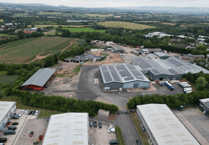THE owner of a Porlock campsite could lose his fight to create a workplace home.
Philip Weaver wants to build a two-bedroom property with office accommodation at the Sparkhayes campsite so that he can better manage the business that was started by his grandfather in the 1940s.
But Exmoor National Park planning officers are recommending the application for the two storey traditional linhay building is refused.
The national park's planning committee will be told at its meeting on Tuesday that Mr Weaver is currently living in a small flat adjacent to the campsite which he rents on a short-term tenancy basis and which offers no long-term security.
For many years previously he lived in a mobile home on the site until it was destroyed by fire.
Mr Weaver's grandfather had lived in an adjacent farmhouse but that had been sold to pay death duties, with the family retaining the campsite.
In a report to the committee, head of support to the community David Wyborn said Mr Weaver had bought the rest of his family out and become the sole owner of the business in 2007.
The justification for the dwelling was that the business could not survive without it, with Mr Weaver maintaining that Sparkhayes was the only village or town centre campsite within the national park without 24-hour on-site management.
In support of his application Mr Weaver said "remote management" of the campsite raised problems when customers were booking in or out, especially late at night or early in the morning.
It was also difficult to enforce rules on behaviour, while a 24-hour on-site presence would mean customers would have a safe, warm place to go and the surety of a landline telephone in emergencies.
The campsite was said to rely entirely on booking fees and needed to run as efficiently as possible to continue to be a viable business.
The alternative of buying a nearby property was not an option because those for sale in the immediate vicinity were too expensive.
The application won the support of Porlock Parish Council, who recommended approval.
But in his report Mr Wyborn said the main consideration was whether the proposal complied with local and national planning policies.
He said the need for a full-time worker on site to cover the issues raised could be easily addressed by the installation of alarm systems, improved access arrangements and occupying a house close to the site.
Mr Wyborn said the issues raised were not significant enough to justify a dwelling.
If approved, the property would lie outside Porlock's development limits and could not be deemed affordable housing.
"If allowed, this dwelling would set a precedent for the principle of justifying open market unrestricted dwellings in association with campsites which would be based purely on the grounds of the booking in and out of customer, behaviour management and health and safety reasons," he said.
"It would establish a principle making it difficult for the authority to resist other applications if they claimed the same grounds.
"This would result in sporadic housing development, the cumulative impact of which would undermine the character and appearance of the national park."



